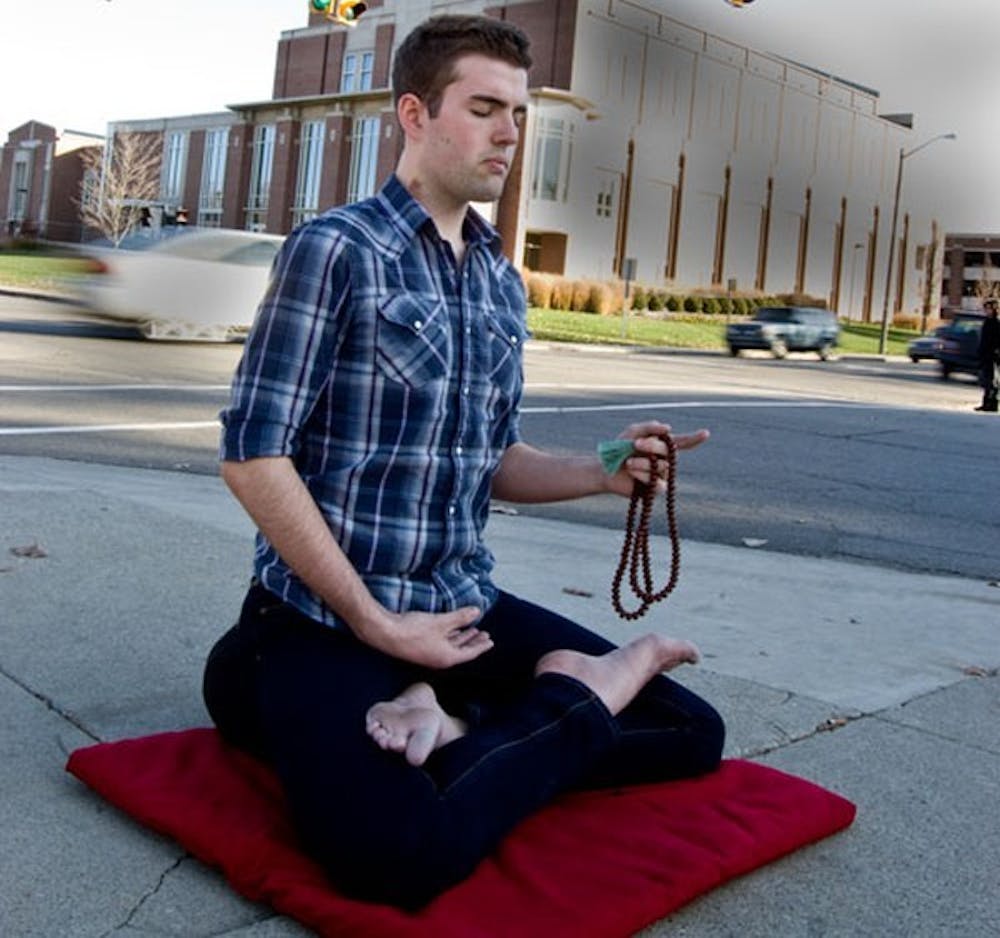A student slams a piece of paper down on the front desk at Elliott Hall.
"Who started this?" she demands.
"I did," replies Ryan Shanabarger from behind the desk.
The paper extrapolates on the First Amendment — particularly as it pertains to religion. While Shanabarger is not entirely sure if it was posted somewhere and if so, who posted it and why, he has an idea that it might be in response to the fliers he put up in Elliott Hall on Tuesday night.
His posters are a call to debate, as he says, about theism and atheism. One of the fliers equates Jesus, Allah and God to Harry Potter. But unlike Harry Potter, the poster reads, these imaginary characters are mean and divisive.
The student wants to help. She empathizes with the disapproval Shanabarger has encountered since posting his fliers. Like Shanabarger, she is an atheist. But Shanabarger is a somewhat unconventional atheist: He is also a Buddhist.
Shanabarger, a sophomore philosophy and religious studies double major, grew up Catholic in Kokomo, Ind. As a teenager, Shanabarger wanted to devote his life to the Church. In fact, he wanted to be a Franciscan monk.
But that changed after what Shanabarger describes as a personal event in his life.
"That was a time of true emotional upheaval and I began to look for other systems of belief that might work better with my new lifestyle," he said. "I was attracted to Asian culture — especially Japanese culture — when I was a kid. So being interested in religions and Asian culture, obviously Buddhism was one that immediately came to mind."
After graduating from high school, Shanabarger went to Paris for a year where he worked as an au pair. There he met a group of Buddhists who helped solidify his belief in Buddhist teachings.
Shanabarger's atheism stems from his Buddhist beliefs, though he said atheism is not a central focus of Buddhism. Shanabarger said it was not until three weeks ago that he realized his Buddhism made him a de facto atheist.
"The majority of Buddhism, at least to a Christian, would seem atheist," he said. "In Zen Buddhism, it [the existence of a god] is not necessarily negated, it's just kind of ignored."
No form of Buddhism believes in a creator or god, Shanabarger explained, although Tibetan Buddhism is a pantheistic belief. Zen Buddhism, which is what Shanabarger practices, does not believe in any form of god.
Ball State University professor emerita of religious studies Julia Corbett-Heyemer describes herself as a Buddhist-Unitarian Universalist-religious humanist-mutt.
Heyemer said although there are different forms of Buddhism, they all adhere to the same basic tenets know as the Three Refuges: the Buddha, the Dharma and the Samgha.
The Buddha, both the actual man, (Siddhartha Gautama), and the "indwelling Buddha nature" as Heyemer calls it, signify enlightenment.
"Because the Buddha was a human being, not a god or god-human, every human has the capacity to become enlightened," she said. "The Buddha isn't a savior; we're responsible for our own enlightenment."
The Dharma is the path one ought to follow, as taught by the Buddha and the Samgha is the community of those who follow that path.
Shanabarger said the Samgha is one of the most difficult parts of being a Buddhist in Muncie.
"In Paris, I was able to have an actual Samgha — an actual grouping of people who get together regularly to mediate or to do things together," he said. "In a place like Muncie there aren't many resources and you have to be a bit more creative."
Shanabarger said the Internet is one of the best resources for Buddhists.
"You can study Buddha, Dharma and Samgha. You can actually have a Samgha online. You can create your own; you can have chat rooms and forums and things where you interact with other people."
Muncie Buddhists can also attend Muncie Mediation and Dharma on Sundays at the Unitarian Universalist Church of Muncie or they can take part in dialogs at Interfaith Fellowship meetings every fourth Monday of the month at the Ball State Center for Peace and Conflict Studies.
Although there are meetings for Buddhists, Shanabarger said Buddhism is very much individualistic which is why many people are more apt to call it a philosophy than a religion.
The ultimate goal for a Buddhist it to reach nirvana: the freedom from all worldly concerns. For Shanabarger, that has practical applications to his life.
"In any situation, you're going to have how you take things — how things appear to be," he said. "Just the other day I got a ticket. I was racing down I-69 trying to get back for work and I got pulled over."
He'd never gotten a ticket before but rather than being upset, Shanabarger said his Buddhist mentality helped him to perceive the situation rationally.
"I sat down and I was like ‘Fine.' I drove back to work, I was completely cool about it," he said. "I saw that it was about $115 and I was like, ‘Oh, that's a lot of money but I don't really care.' I did something that was against the law and now I'm getting punished for it and it's OK."
"Buddhist morality or ethics focuses on skillful behavior," Heyemer said. "That is, behavior that enhances connection makes for peace and is in accord with reality."
Shanabarger said this allows people to practice Buddhism along with any other faith they may adhere to.
"We're talking about specific practices like yoga or exercise, you don't have to change your core belief system to benefit from what Buddhism has to offer," he said.
Fellowship
Muncie Buddhists can also attend Muncie Mediation and Dharma on Sundays at the Unitarian Universalist Church of Muncie or they can take part in dialogs at Interfaith Fellowship meetings every fourth Monday of the month at the Ball State Center for Peace and Conflict Studies.





